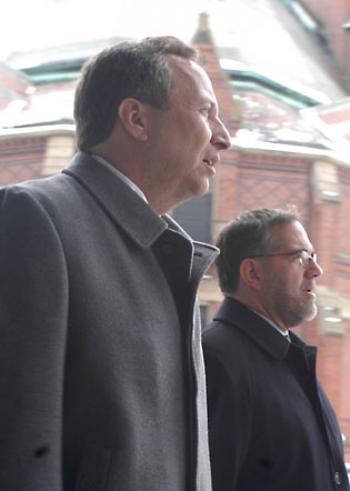
News
HMS Is Facing a Deficit. Under Trump, Some Fear It May Get Worse.

News
Cambridge Police Respond to Three Armed Robberies Over Holiday Weekend

News
What’s Next for Harvard’s Legacy of Slavery Initiative?

News
MassDOT Adds Unpopular Train Layover to Allston I-90 Project in Sudden Reversal

News
Denied Winter Campus Housing, International Students Scramble to Find Alternative Options
Playing the Diplomat, Summers Looks To A Still-Uncertain Future

Lawrence H. Summers’ rematch with the Faculty of Arts and Sciences fell short of the fierce hostility that marked their initial bout, but though he spoke yesterday of “opening a new chapter,” the besieged University president appeared for now unable to turn the page.
Skeptical professors, backed by nearly unanimous applause, flatly rejected what appeared to be a choreographed attempt to address the uproar over Summers’ leadership. The proposed committee, which the president did not address but surely favored, died a quick death yesterday and left Summers without a concrete stepping stone from which to move beyond the Faculty’s discontent.
With the provost, Steven E. Hyman, literally rallying to his side, Summers took a circuitous route to the Faculty meeting from his office in Mass. Hall yesterday, carefully avoiding the throng of protestors that would have met him on a more direct journey.
In the basement of Lowell Lecture Hall prior to the meeting, Summers consulted with his staff and, just before heading upstairs for round two with the Faculty, took a minute to himself in an empty room usually reserved for undergraduate sections.
The environs of Lowell Lecture Hall placed yesterday’s drama in a theater that seemed to befit the magnitude of the event. While Summers’ job appeared more secure heading into the meeting, his ability to effectively govern the University remained—and, indeed, still remains—an open question.
Summers reached out to his opponents on Thursday with the release of a transcript of his controversial remarks on women in science, but it appeared unlikely to deflate what have been more holistic critiques of his administration extending far beyond his comments last month.
Summers twice used the word “collegial” yesterday, once in his opening remarks to the Faculty and again in a brief statement released after the meeting. The word appeared to evoke not just the academic setting over which Summers presides but also a spirit of inclusiveness that his critics say has been missing from his leadership to date.
“These conversations are important to all of us, and to the university we all care about,” Summers told the Faculty. “And they are essential to restoring the open, collegial culture on which this Faculty depends.”
But convincing professors of his commitment to collegiality would appear a tall task for Summers, whose opponents have assailed him for running the University in exactly the opposite fashion.
And his critics aside, Summers’ leadership style has been most notable for its resistance to Harvard’s age-old decentralized structure, in which each “tub” is said to exist on its own bottom.
Just months before this latest flap, in an essay for Harvard’s alumni magazine, Summers argued for a measure of autonomy as the University’s chief.
“At the same time,” he wrote, “we have also seen that the team cannot be managed by its players. Too often, universities have been managed as kibbutzim, with academic leaders elected by faculty, students, and staff, thus undercutting mandates to impose high standards and the creation of leadership horizons sufficient for true long-term innovation.”
But yesterday, Summers said the Faculty should play a powerful role in his administration.
“It is essential that we have an environment where all members of this Faculty are encouraged to speak their minds freely, where decisions are reached with mutuality, and where careful attention is paid to the respective roles and responsibilities of faculty and administration,” he said.
Through his spokeswoman, Summers declined to elaborate last night on his remarks.
As some professors milled about on the floor of Lowell Lecture Hall after the meeting, Hyman, Summers’ deputy in the central administration, attempted to gather a cadre of administrators to accompany the president upon his departure from the building.
Calling to William C. Kirby, whom Summers appointed as dean of the Faculty in 2002, Hyman said, “Bill, we want to walk out as a group.”
—Staff writer Zachary M. Seward can be reached at seward@fas.harvard.edu.
Want to keep up with breaking news? Subscribe to our email newsletter.
